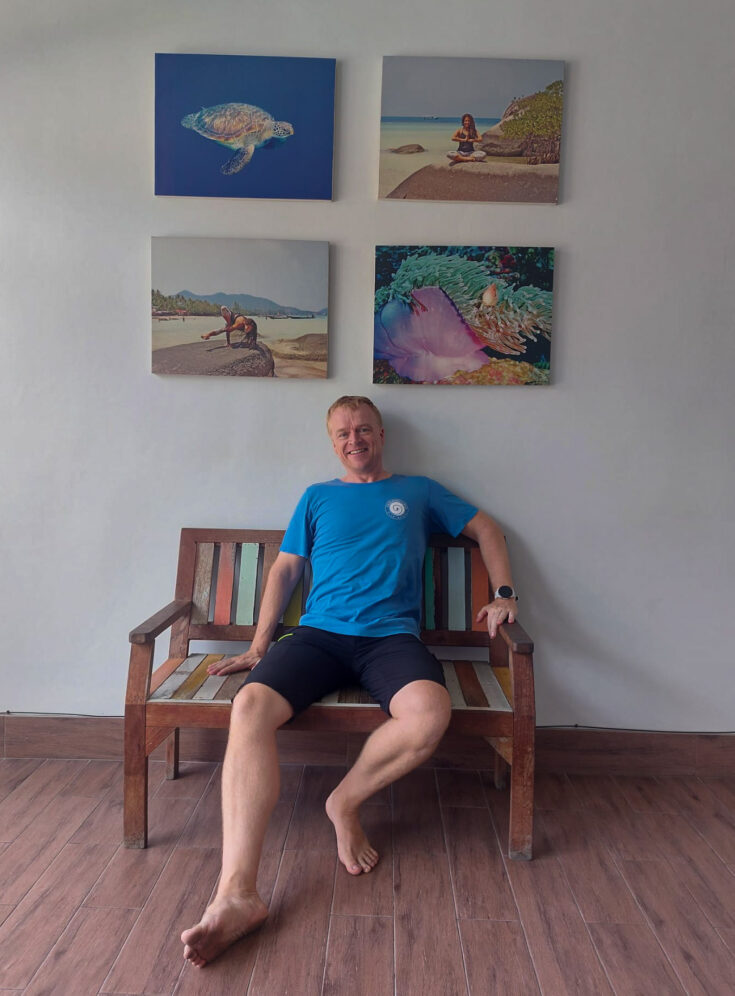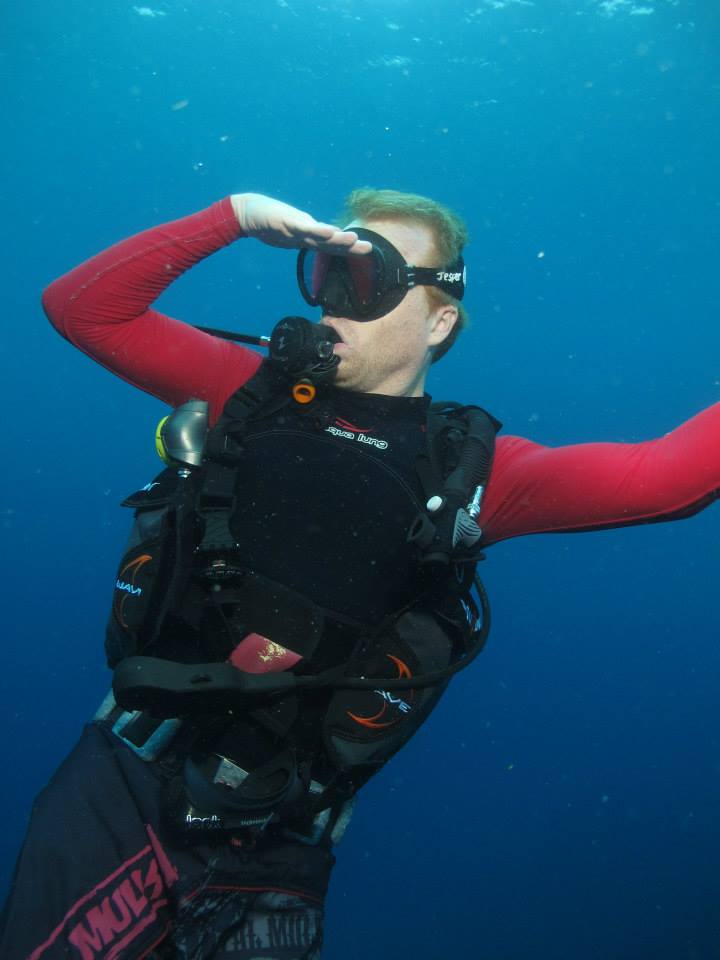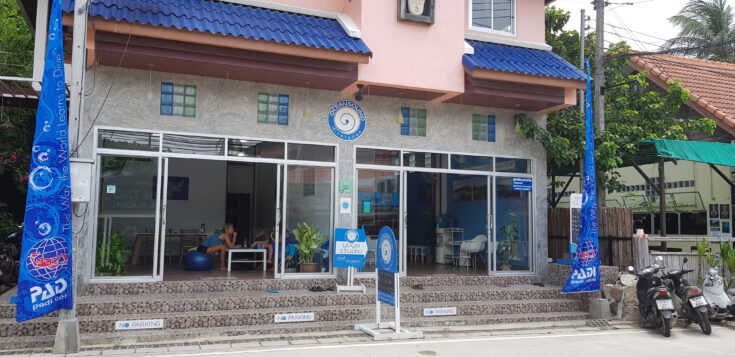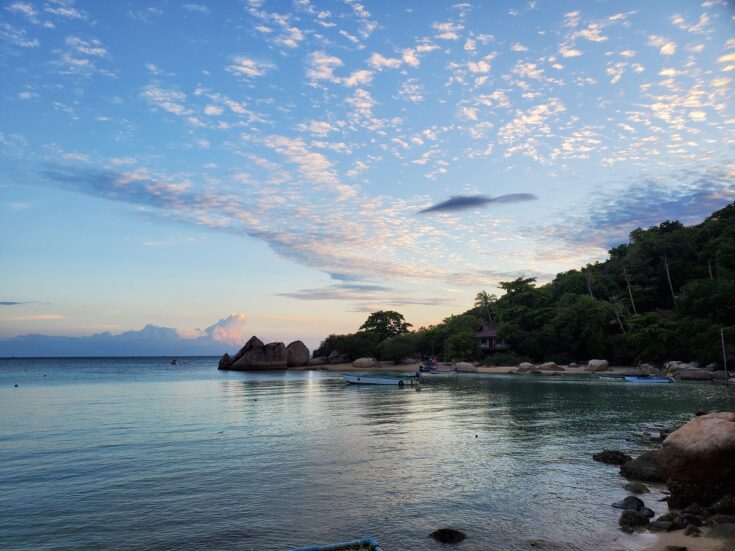
Danish Jesper Ahrentz started his own diving school OceanSound on the island Ko Tao in Thailand ten years ago. He fell in love with diving the very first time he attempted it and has now built a life around his hobby.
Jesper Ahrentz felt the water all around his body. He concentrated on breathing air in through the tube in his mouth. Jesper felt weightless, just floating in the water. Bubbles rise to the surface when he exhales, making a quiet sound as they pass his ears. The deafening sound of silence surrounds his weightless body.
At the bottom of an ordinary swimming pool, wearing a wetsuit, mask and an oxygen tank on his back, Jesper is struck by a sudden passion and the burning wish for this not to be his last dive.
“I was completely amazed, and I hadn’t even left the pool nor seen any fish,” Jesper said.
When he left the pool that day, he went up to the instructor immediately.
“What do I need to do to become a real diver? What are the steps I need to take,” he asked the diving instructor.
Making memories
Jesper loves teaching other people how to dive. As a young teenager in Denmark, he used to work in a kindergarten and he believes teaching adults and children is more similar, than you’d think.
“I often think this because we really go back to basics. Teaching people how to put on the equipment is like teaching 4-year-olds how to put on shoes. You explain them what will happen today and then you take them for a swim. They look at the fish and point at the corrals. Sometimes they say wow look at this fish,” Jesper said and laughed.
Jesper loves the personal connection he gets to have with his pupils, and he loves giving them a new and exciting memory to cherish. Even though he has had a lot of jobs in different countries, he believes there are few jobs with the same kind of personal contact as diving. Jesper believes, that for a lot of people, their first dive is a memory that they will remember for the rest of their lives.
“I think it sticks with them because we introduce them to a completely new world underwater, that they maybe didn’t even know existed. Maybe it sounds like a cliché, but I think it is true,” Jesper said.
I have multiple times experienced, that the pupils get a close tie to the people that taught them how to dive. I have a whole network across the world of people I have taught. Jesper went from being a hobby diver, to a teacher, to now owning his own diving and yoga school OceanSound on Ko Tao.
From travelling through to a new home
The first time Jesper was on Ko Tao, he was a backpacker. He only stayed for two weeks, but Ko Tao always stayed in the back of his mind as one of his favorite places.
Jesper was supposed to travel for six months. He was 17 years old, had just finished high school, and was ready to see the world. After the summer he was supposed return to his normal life and start studying ethnology at the university in Aarhus in Denmark. Everything was figured out and he even had student accommodation waiting for his return.
“I didn’t really know what I wanted in life, but I thought it would be best to study something. I didn’t really know what ethnography was about, but I figured it could be interesting to learn about different cultures,” Jesper said looking back at his 17-year-old mindset.
Jesper travelled from Denmark to Australia and after six months of seeing the world, he realized he didn’t have enough time to see all the things he wanted to. Jesper decided to postpone his return to Denmark another year. But after one-and-a-half years of travelling Jesper realized – he wasn’t done at all.
“There were so many things to see in this world, and I thought that I could always just return and start studying if I wanted to. One year didn’t really seem to make that much of a difference,” Jesper said.
Jesper decided to give up his spot at the university – he could always apply again later if he at some point wanted to study.
He travelled around Southeast Asia and Australia the following two to three years. Every time he called home, his parents eagerly awaited his return, but his answer disappointed them – he was not ready yet.
After some years his mindset shifted from “when will I return?” to “will I return?”. It took Jesper three years to even step on Danish ground again, but he was still not done travelling.
“In the end I was tired. Tired of the busses and the planes and the new places. I needed a more stable base and some people I could spent time with for longer at a time,” Jesper said.
Jesper’s plan was to not have a plan. He wanted to go to Ko Tao to be a diving instructor for some time. 20 years later, he still calls the small island his home.

A life changing business
When Jesper and his partner Will started their own diving company 10 years ago, it started with a small website. But soon more and more students booked courses, and the success of the business has exceeded their expectations.
“The diving school has changed our lives completely,” Jesper said.
Both divers had lived on the island for some time, and they wanted to create their own school.
“Koh Tao is a very busy island with big diving schools and a constant flow of visitors. It can feel a bit like a factory, where you produce as many divers as possible. The idea was to create something more personal and less fast-paced,” Jesper said.
On the island Ko Tao, a two-hour boat ride from the shore of Thailand, a paradise for backpackers and divers reveals itself. White sandy beaches and colorful coral reefs attract tourist all year round. Jesper is one of the lucky ones to be able to call this paradise his home.
Jesper walks from his office to the beach. The air is warm, and the sun is bright. Jesper continues walking in between the wooden huts surrounded by palm trees and bushes down to the beach. He says “sawadee krab” to the workers on the way and folds his hands in a “wai” in their direction
On the beach, the water has been pulled back by the tide, revealing small white seashells and pointy rocks.
Two young people are sitting on a bench drinking water.
“Hi, how are you this morning?” Jesper says.
“I am feeling better now,” the girl says with tired eyes.
The girl had gotten sick while diving, and had been hospitalized for two nights, to make sure it wasn’t divers sickness. He gives her some words of encouragement and they discuss how she will return home the next day.
Aside from the connection with his pupils one of the main principles of the diving school is maintaining a healthy balance between work and time off. Jesper only works six months in a year and the rest of the year he can travel. His partner works for the second half of the year. For Jesper, starting his own company meant creating a lifestyle around his passion for diving.
Most divers work long hours every week, as their work and their hobby flow together. The school operates 7 days a week, but many of the divers tell him it doesn’t feel like work.
“Sometimes the divers at our school tell me, that they can’t understand that they get money for this job. For many it’s their hobby and what they would love to do all the time anyways. Of course there is also a backside, because the lines between work and time-off gets blurry,” Jesper said.
Jesper sees it is as a privilege to be able to do something he loves every day, which is why he even goes on diving holidays in his spare time. According to Jesper, some of the divers even go diving on their day off, or they join others on their tours.
“I think there are few people, who really look forward to their work every day,” Jesper said.

The island family
Jesper’s family back home in Grenaa had a hard time understanding why he never came back, and how their son had drifted further and further away from a traditional Danish lifestyle.
“I think they for a long time believed, that I would come back to study, because it wasn’t my plan to stay from the beginning, it just happened along the way. I think they hoped I would get an education and do something reasonable with my life. Get a public pension and focus on retirement savings,” Jesper said and chuckled.
Jesper’s life is currently a bit different than that, and it has been hard for his family to accept it at times.
“I know that they all want what is best for me. But I think their idea of what is best, is just a bit different than mine. They want me to have more security and stability – things we have back in Denmark. My life is maybe a bit harder to fit into a specific frame,” Jesper said.
It was mostly Jespers mom who had a hard time with it, but with time it has gotten better. Jesoper believes the concern also stems from them not understanding what he does for work and on Ko Tao. His brother has visited a couple of times, but for Jesper’s mother Thailand is very far from Denmark.
When Jesper is in Thailand, he talks about Denmark as his home. But when he goes to Denmark every two to three years, he feels like a stranger. He feels like he doesn’t know what’s going on in Danish society
“Sometimes it is very basic things that I simply don’t know. Like all sorts of things about culture, society and politics. I don’t know who the important people are anymore,” Jesper said.
Jesper has built a second family on Ko Tao, they call it an island family.
“People who come to Ko Tao for longer get intrigued by the lifestyle. It is a great atmosphere and because the island is small, everyone knows each other. Ko Tao is like a magnet,” Jesper said.
But even though Jesper has lived on Ko Tao for more than 20 years, he still doesn’t feel like a completely integrated member of Thai society.
“I know people who are married with a Thai spouse, have children and maybe even a business. But they still don’t feel like a member of Thai society. Maybe it will always be like that,” said Jesper.
But he has found his peace with being a person who belongs in multiple places rather than one.
“Maybe nowhere is home for me. But Ko Tao is more home than any other place,” Jesper said.
The happiest country in the world
Living in Thailand has giving Jesper new perspectives on life back in Denmark. He especially noticed the gratitude of the people on Ko Tao and Thailand in general.
“Life here can be simple but good. People don’t have much on Ko Tao, and they don’t care about materialistic things, but people still live a good life and are grateful for the lives they have,” said Jesper.
When he visits Denmark he notices, how much in a rush the Danes are.
“People are always busy, and they don’t have time to meet because they are doing something at all times of the day. People are stressed at work and so on,” Jesper said.
Jesper feels that in Thailand people are better at focusing their time on what they want to do and especially on the islands people are a bit more relaxed.
“For example, I don’t know what day it is today. I need to look at my calendar to know. I think maybe it’s Tuesday. On the other hand, the locals of course work very hard, they work six days a week 12 hours a day. But here we don’t have the feeling of rushing through life,” Jesper said.
Jesper thinks Danes should be better at realizing, that many live a very good life compared to the rest of the world.
“We always get told, that we are one of the happiest countries around, but sometimes I think we focus on the negatives. Maybe people down here are better at appreciating happiness, because it is not a given,” Jesper says.




